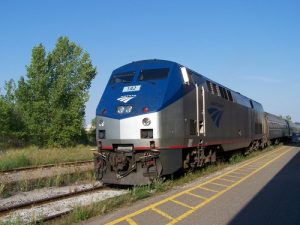
Progress in the United States toward implementing Positive Train Control (PTC) safety technologies needs to pick up some speed, said U.S. Sen. Roger Wicker (R-MS) during a March 1 Senate Commerce, Science, and Transportation Committee hearing on the matter.
“I understand that testimony has not been particularly encouraging about our collective ability to have this requirement fulfilled by the end of the year,” said Sen. Wicker, referring to the Dec. 31 deadline set by Congress in 2008 mandating all Class I railroad main lines that handle poisonous or toxic-by-inhalation hazardous materials and any railroad main lines with regularly scheduled intercity and commuter rail passenger service fully implement PTC.
“The chairman and ranking member’s statements indicate that, on behalf of the Congress, they’re trying to say that patience is running out,” Wicker told hearing witnesses, who included federal officials from the U.S. Government Accountability Office, the U.S. Department of Transportation (DOT), and Richard Anderson, president and chief executive officer of Amtrak.
There is urgency around having PTC implemented nationwide following several deadly Amtrak train wrecks in the last few months — the most recent a Feb. 4 Amtrak passenger train collision with a stationary CSX Transportation freight train in Cayce, S.C., that killed two people and injured more than 100 others.
PTC is an advanced system designed to automatically stop a train before certain accidents occur, including train-to-train collisions and derailments caused by excessive train speeds. The National Transportation Safety Board has reported that many of the recent train accidents could have been prevented if PTC had been installed on the tracks.
Additionally, the Dec. 31 PTC implementation deadline is already the second extension with Congress allowing one in 2015, according to DOT’s Federal Railroad Administration (FRA), which said the possibility of extending it again to a date no later than Dec. 31, 2020 exists if a railroad completes certain statutory requirements necessary to obtain an extension. But that’s not something federal lawmakers want to do.
“Clearly, we’re trying not to shut down train traffic around the country at a date certain, but we need whoever to understand that we need to get the attention of those responsible and get a timetable that will work and avoid, I might say, a train wreck coming either figuratively or literally,” Sen. Wicker said during the hearing.
During questioning, Sen. Wicker specifically asked Amtrak’s Anderson about PTC implementation in his home state along the Gulf Coast. Passenger rail service hasn’t been running along certain routes there since Hurricane Katrina hit in 2005, according to the senator’s office. Wicker’s ongoing efforts on Capitol Hill to support restored service in the region continue, including a 2016 inspection trip with a group of officials to the area, and his leadership in the establishment and funding of the Gulf Coast Passenger Rail Working Group, which released a 2017 report to Congress estimating the capital costs required to restore service at roughly $118 million. The lack of quick PTC implementation on lines servicing the Gulf Coast could mean delays for the restoration of passenger service between New Orleans and Mobile, Ala., and between New Orleans and Orlando, according to Wicker’s office.
Anderson testified that successful service will be restored between New Orleans and Mobile. However, he said the main PTC implementation challenge remains the failure to enforce current regulations regarding rail traffic preference and incremental cost rights, which enable trains to make their schedules, provide reasonable rates to passengers, and allow shared travel routes with freight trains, according to Wicker’s office. “The law is there, but since 1971, there has never been any effective enforcement over the preference action,” said Anderson. “That’s why the long-distance service at Amtrak runs at massive delays.” He asked for Wicker’s help via legislative changes that would encourage the Surface Transportation Board to enforce provisions that would allow Amtrak to make nationwide passenger train improvements, according to the senator’s office.
Anderson also told the congressional committee that it was “highly probable” that some of its systems would not meet the Dec. 31 deadline for the PTC enhancements in other areas of the country.



